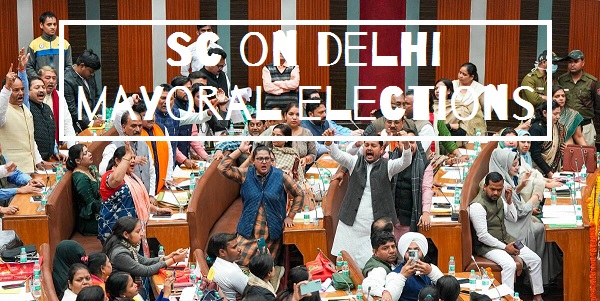SC on Delhi Mayoral Elections- Background & Reasons

From Current Affairs Notes for UPSC » Editorials & In-depths » This topic
IAS EXPRESS Vs UPSC Prelims 2024: 85+ questions reflected
After failing to elect a Mayor to the DMC inspite of 3 sessions being convened, the political impasse ended up in the top court of the country. Recently, the Supreme Court gave clarifications, finally clearing a path for the corporation’s members to choose their next chairperson- Shelly Oberoi.

Background:
- The Mayor is the chairperson of the Delhi Municipal Corporation, a body concerned with functions like:
- Managing water supplies
- Maintaining drainage system
- Overseeing road and over-bridges construction and maintenance
- Running hospitals and dispensaries
- Collecting property tax, etc.
- The 1957 DMC (Delhi Municipal Corporation) Act requires the Mayor and Deputy Mayor to be elected in the 1st session of the House after civic polls.
- The municipal elections were conducted in December 2022 and the results showed that the Aam Aadmi Party, with 134 out of 250 seats, narrowly beat the Bharatiya Janata Party.
- The 1st session of the House was convened in January 2023. However, following disturbances in the House, it was adjourned by the Presiding Officer without electing a Mayor.
- The same repeated in the next two sessions as well.
What is the dispute about?
- Whether or not the aldermen should be allowed to vote in the Mayoral elections is a key part of the dispute.
- Aldermen are nominated members of the municipal body. In January, the Delhi Lieutenant Governor nominated 10 aldermen, notably, all from BJP.
- The Presiding Officer (Pro-tem Speaker) announced that the aldermen would be allowed to vote in the elections of mayor, deputy mayor and Standing Committee members. This led to opposition from the AAP, which called for a ‘court-monitored’ election. It then took the matter to the Supreme Court.
What has the SC ruled?
- Recently, the 3-Judge Supreme Court bench, headed by the CJI, cleared the way for Mayoral elections in Delhi.
- The court ruled that the Delhi Municipal Corporation’s nominated members cannot vote in the elections of Mayor, Deputy Mayor or Standing Committee members.
- It said that once elected, the Mayor is to preside over the elections of Deputy Mayor and the Standing Committee members.
- It rejected the argument that nominated members can vote in the 1st session after elections, but not in the subsequent sessions.
- It highlighted how the Constitution imposes restriction on the voting rights of members “who are brought in on account of their special knowledge of experience in municipal administration”. It said that the same finds statutory recognition in the DMC Act- meaning, the aldermen aren’t allowed to vote in any meeting of the DMC.
What is the way ahead?
- The SC verdict is an affirmation of the cardinal democratic principle: only elected representatives elect the Mayor.
- However, the overall dispute itself raised concerns about how civic governance in Delhi has long been clouded by disharmony.
- The NCT has a peculiar administrative status which is a test of the adherence by the Centre, the Delhi government and the municipal agencies to the federal principles. Unfortunately, the three have rarely been on the same page in the recent past, especially in the last 8 years:
- Delhi saw a number of strikes by sanitation workers over unpaid salaries.
- The Delhi HC had to intervene, on behest of municipal hospital doctors, in the middle of the pandemic, to direct the state to address the issue of unpaid salaries.
- Similarly, the court had to intervene to get the municipal school teachers’ salaries released.
- While these financial issues continued to plague the civic bodies, the parties in power at various levels opted to play the blame game.
- Notably, the reason why the MCD elections were postponed for over 6 months was the merger of the 3 civic bodies, specifically to address the fund management issue.
- It is crucial that the stakeholders, overcome political considerations and cooperate to make the newly formed corporation function seamlessly and efficiently.
Conclusion:
The recent SC verdict is a welcome break in the long stretching impasse in Delhi Mayoral elections. Seamless functioning of the municipal bodies is vital to ensure that Delhi remains on its feet.
Practice Question for Mains:
Discuss the recent SC verdict on Delhi Mayoral elections. (250 words)
If you like this post, please share your feedback in the comments section below so that we will upload more posts like this.

